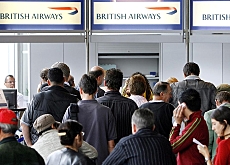Airport body scanners divide Swiss

A debate has been sparked in Switzerland over installing body scanners in airports after a terrorist attempt prompted the Netherlands to roll out the machines.
The Swiss aviation authority says the scanners would be a useful security tool, but the defence minister has ruled them out.
Dutch authorities say 15 of the machines will be in use at Amsterdam’s Schiphol airport within three weeks for passengers travelling to the United States. Nigeria and Britain also plan to introduce the scanners soon.
It follows an attempt to blow up an aircraft over Detroit on Christmas Day. Nigerian terrorist Umar Farouk Abdulmutallab had boarded the Northwest Airlines plane in Amsterdam wearing the explosives under his clothes, but the device burst into flames instead of detonating.
A key European lawmaker has called for greater use of the scanners, which capture detailed images of people’s body contours and are designed to spot explosives and other non-metallic objects that a metal detector would miss.
Peter van Dalen, vice chairman of the European Parliament’s transport committee, said newer technology showed the scanners did not violate travellers’ privacy and urged the installation of the equipment across the 27-nation bloc.
In 2008 the European Parliament voted against using such machines and called for further study, allowing Schiphol to conduct a pilot test of the scanners.
In Switzerland, although airport security measures were tightened over the holiday period, opinion was divided over the merits of bringing in such scanners.
“Effective tool”
The Swiss Federal Office of Civil Aviation (FOCA) said there were no plans underway to introduce the scanners in Geneva, Zurich or Basel airports, but if the machines were approved on a European level Swiss airports should follow suit.
Spokesman Daniel Göring told Swiss radio that the scanners could be “useful and effective” as a complementary tool for existing security controls, and he backed their introduction across Europe.
However, Defence Minister Ueli Maurer was quick to dismiss the machines. “It would be unacceptable for people to be viewed completely naked,” he told television station TeleZüri.
Less drastic measures would be just as effective, he argued, such as improving counter-terrorism alert systems, strengthening collaboration between secret services and the international exchange of information.
For its part Geneva airport said it was already responding to recommended security measures and it did not foresee installing the scanners as there were no convincing arguments for them in the locations where they had already been in use.
“But if FOCA or American companies require it, we will adapt,” a spokesman said.
More privacy
Body scanners that see through clothing have been available for several years, but their introduction has been slowed in some countries by privacy concerns. The American Civil Liberties Union for example has denounced the machines as a “virtual strip search” because they display the body’s contours on a computer screen with great clarity.
New software however can protect travellers’ privacy by producing a stylised image of the body instead of a more detailed picture.
Some manufacturers already offer privacy enhancements such as blurred faces or bodily images that look like chalk outlines.
On Sunday Britain’s main airport operator BAA said it had ordered full-body scanners and would introduce them as soon as possible. BAA operates Europe’s busiest airport, Heathrow, as well as other British airports.
Travel inconveniences
Kurt Spillman, a professor in conflict research and security at the Federal Institute of Technology in Zurich, still expects body scanners to be in use in Switzerland within two to five years.
“Switzerland will take on the standards of the EU. I think body scanning, as an additional security measure for preventing terrorist attacks, will be used for flights to the US,” he told the Neue Luzerner newspaper.
He thought the extra security step would eventually become accepted by passengers, as have other measures in place since the 9/11 attacks.
“Despite all the inconveniences such as removing shoes [at the security checks] or the ban on carrying liquids in hand luggage, people continue to travel unabated around the world,” he said.
“Body scanning slows down the check-in procedure, it’s unpleasant, but there’s no stopping it. Anyone who does not want to undergo this can stay at home.”
swissinfo.ch and agencies
Full-body scanners, unlike the standard archway metal detectors currently used in airports around the world, use radio waves to generate a picture of the body that can see through a person’s clothing and spot hidden weapons or packages.
The technology was first used about two years ago to make it easier for airport security to do body searches without making physical contact with passengers.
Amsterdam’s Schiphol airport has 15 body scanners, each costing more than $200,000 (SFr207,000). But until now the European Union has not approved routine use of the scanners at European airports.
In the US, 40 full-body scanners are being operated in at least 19 US airports and is optional, with pat-downs an alternative. The US Transportation Security Administration has ordered 150 more full-body scanners to be installed in airports throughout the country in early 2010.
Nigeria’s Civil Aviation Authority says it will buy body scanners and hope to begin installing them next year.
The number of travellers and flights in Switzerland has risen steadily in recent years, encouraged by favourable economic conditions. This is despite the terrorist attacks on the United States in 2001.
Between 2002 and 2006 the total rose by around 16 per cent, from 29 million to 34 million.
According to the Federal Aviation Office, the total number of passengers for Zurich airport will rise from 19 million to 40 million by 2030.
Capacity should be pushed to its limit by around 2030, according to the office.

In compliance with the JTI standards
More: SWI swissinfo.ch certified by the Journalism Trust Initiative











You can find an overview of ongoing debates with our journalists here . Please join us!
If you want to start a conversation about a topic raised in this article or want to report factual errors, email us at english@swissinfo.ch.